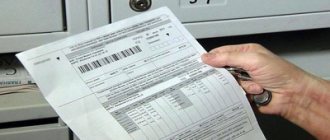Federal Law No. 45-FZ dated March 2, 2016 introduced corresponding amendments to Art. 122 Code of Civil Procedure of the Russian Federation. The list of requirements for which such a court ruling is issued has been supplemented and expanded. It included demands for collection of debts on utility bills, telephone services, payments and contributions to HOAs or housing cooperatives.
The site employs lawyers who are ready to help in difficult situations. Consultation is free.
The procedure for collecting utility bills
Let us immediately note that this procedure is not too complicated and has three stages: pre-trial, judicial and enforcement proceedings:
- The pre-trial procedure for collecting utility bills involves filing a claim against the defaulter. Such collection of utility bills cannot be called effective, since no more than 30% of debtors respond to it. A notice of disconnection from a utility service gives the greatest result in working with debtors (follow the link for more details on the procedure for disconnecting utilities for non-payment).
- Court. Mostly housing and communal services resort to judicial proceedings. Since it takes a long time to wait for payment during a peaceful settlement of the conflict, moreover, issues of quality of services provided by the service organization or recalculation constantly arise between the parties. As a rule, all controversial issues cannot be resolved without a trial.
- Execution of a court decision. Next, the court receives a writ of execution or a court order, submits an application to initiate enforcement proceedings at the bailiff service, and begins enforcement of collection of amounts collected from the debtor.
ATTENTION: do not miss the opportunity to consult a lawyer for free without a phone through commenting - by subscribing to our YouTube channel.
What actions should be taken next?
The Code of Civil Procedure does not speak about the procedure for considering an application to cancel a court order. However, this appeal is considered immediately upon receipt by the magistrates' court.
If enforcement proceedings have already been initiated, care should be taken to suspend the case. It is better to do this on the day of filing objections, by contacting the bailiff with a request to suspend enforcement proceedings. This can be done in the form of a petition.
When a court cancels a court order for utility services, this does not mean that the conflict is settled. Next, the resource supplying organization or management company can file a claim to collect the debt from the owner of the residential premises. And then all your arguments need to be confirmed in objections to it.
Naturally, documentary evidence will also be needed regarding the actual amount of the amounts, the expiration of the statute of limitations, and errors in calculations.
How is the statute of limitations for utility bills calculated?
The initial stage of the process after a claim is the issuance of a court order. In this case, one should also take into account such a term as the statute of limitations, according to which debts are collected for services already provided exclusively without fail within a certain time period.
Please note that the time frame for collecting utility bills is provided as a general one (it is set for 3 years for claims from the moment the debt was incurred for the current month).
The debt is collected for payments within an indefinite payment period, a uniform period of 3 years is applied. During this period, a person has the right to pay off the debt, distributing it at his discretion over the entire period, but at the same time he risks receiving penalties for using the money.
FAQ
Misunderstandings with management companies and organizations providing electricity, hot and cold water supply, and heating services often arise. Causes:
- actual debt;
- failures in the supplier accounting system;
- inaccuracy of data entry when calculating the receipt amount;
- duplication of accounts;
- Late receipt of information on the completed balance replenishment.
Is it possible to cancel a decision if the defendant lives in a municipal apartment?
Current legal norms do not differentiate housing by form of ownership. The same legal norms apply to municipal apartments as in resolving disputes regarding real estate privatized by the owner.
A citizen living in a council house can cancel a court order in accordance with the generally accepted procedure.
Is it possible to appeal if 10 days have passed?
You can appeal against the issuance of an order within three months. And even this period is not the limit for filing an application with objections. You just need to challenge the judge’s act with reason. A citizen might not have the opportunity to submit objections on time for objective reasons: they should be stated in the application, and copies of supporting documents should be attached.
What to do if debts are paid
The order has been issued, but by the time it is issued, the actual debt to the organization collecting payments for housing and communal services has been repaid? It is necessary to submit an application to cancel the legal act.
What to do if you have nothing to pay
Contact the creditor in writing with a request for a deferral of payment of the accumulated debt.
If the amount of debt falls within the framework of five hundred thousand rubles, the court decision is canceled by an objection filed within ten days from the date of its receipt on a general basis.
What threatens
They can turn off the power supply - the simplest manipulation. It is very difficult to deprive consumers of heating, gas and sewerage based on the technical features of communication systems.
Claim for collection of utility bills or court order
Collection of utility payments by court order or through litigation in the event of an obvious dispute is beneficial for both the debtor and housing and communal services. The court for the collection of debts on utility bills makes it possible for utility companies to obtain a writ of execution and begin proceedings to force the debt to be closed, and helps citizens understand the correctness of the accrual.
Why is a court order for utilities more profitable?
If the debtor has not responded to the pre-trial claim, we begin to go to court. In any case, if there is no particular dispute regarding charges, it is advantageous to start with an application to the magistrate for the issuance of a court order for the amount of utility debt.
IMPORTANT: during writ proceedings, the management company saves on state fees by receiving a 50% discount on it, and there is also a reduced period of time spent on judicial consideration of the application.
When is a claim for collection of utility bills required?
If the debtor has sent an objection to the court order to the magistrate or there is a clear dispute over charges, then the housing and communal services service files a claim for collection of utility payments. After which, meetings will be scheduled, for which the utility service must have strong evidence and present it in the form of:
- debt period;
- amounts;
- the entire period of late payments;
- the amount of penalties accrued for late payments;
- the amount of expenses for initiating legal proceedings.
If the service wins, the debtor is obliged to pay the court collection of utility payments in the form of the principal debt for services, accrued penalties and all legal costs.
A court order for the collection of utility bills from registered persons automatically comes into force if the debtor refuses to receive it or does not send an objection to the judge. In this case, housing and communal services have the opportunity to submit an order to the bailiff service.
IMPORTANT: watch the video on the topic of recalculation of utility bills, disputes with management companies: advice from a lawyer on housing issues
How to reduce the amount of debt for housing and communal services
There are several legal ways to reduce the amount of debt for housing and communal services:
- Distribution of obligations among all registered residents of the apartment. The procedure is carried out voluntarily or judicially.
- Regression. If the owner has repaid the debt on his own, the court may withhold part of the amount paid in his favor from other residents of the apartment.
- Statement about the expiration of the statute of limitations for a debt.
- Conclusion of an agreement with the management company. This way you can get a deferment or installment payment plan.
- Subsidies and benefits. To exercise this right, you must submit an application to the social protection authorities.
Calculation of debt for collecting utilities
Debt occurs when a person is 30 calendar days late. From the 31st day the calculation of the debt for collecting utility bills begins. A penalty of 1/300 of the refinancing rate is charged on the amount of debt for all days of delay. Moreover, if the debtor ignores this fact within 3 months, more stringent measures are applied.
If a claim for payment of utility bills needs to be drawn up professionally, then the management company can contact us for help. If, on the contrary, a citizen requires protection, then an objection to a court order for the collection of debts on utility bills or a counterclaim for recalculation will maximally defend the interests of the debtor.
How to write off housing and communal services debts of orphans
Children, who already faced difficulties due to life in an orphanage, also inherit thousands of rent debts from their parents. The housing maintenance organization tries to pay off the debt through the orphan when he reaches the age of majority or, while still under the care of a foster parent, at the expense of funds paid by the state for the same child.
This situation, from a legal point of view, is very controversial. Indeed, by virtue of civil law norms, adolescents under 18 years of age are not responsible for the debts of their parents, and even more so, adoptive parents are not obliged to pay off biological debts, especially from child support. If utility companies want to recover their debts, they need to go to court. At the same time, the child and the adoptive parent will have the tools, if not to completely write off the debt of the former payer, then to significantly reduce it through petitions to apply the statute of limitations, requests to reduce the amount of penalties or complete write-off when the teenager is not alone, i.e. there is other brothers and sisters, or someone else is registered in the premises, then payments should be distributed to everyone in shares. If possible, it is possible to prove that the claim is unfounded for the reason that the minor is not responsible for the debts of his parents. Practice shows that the courts come to the protection of children.
How to challenge a claim from a management company
The first step towards challenging claims from a service organization is to reconcile the actual debt with the amount specified in the application. If there are discrepancies, then it is necessary to “raise” the checks and carry out the correct calculation.
If there are compelling circumstances, attach documents to the counter-petition.
Such certificates may include:
- medical;
- from an educational organization;
- from other departments.
Restoring deadlines.
In a situation where non-payment of receipts occurred over several years, an application should be sent to the court to apply the statute of limitations.
Drawing up a petition to apply the statute of limitations
The petition is formed in a free style, as it is a simple document. No specific knowledge is required to compile the paper. The addressee is the highest authority in the area where the property is located. If the amount of debt does not exceed 50,000 rubles, then the petition is sent to the magistrate.
Compilation rules:
- In the upper right corner:
- name of the department (to whom);
- information about the applicant - a complete form indicating the address of residence (from whom);
- In the central part of the text is “a statement on the application of the limitation period.”
- From the beginning of a new line, a request is stated on the basis of Article No. 199 of the Civil Code of the Russian Federation to consider the paperwork on the statement of claim from the Criminal Code “name”. Justify the application of the regulation by the date of the last payment. Additionally, indicate that the missed period was due to the fault of the management organization.
- At the bottom is a list of attached papers.
- Date and endorsement.
The document for appeal is sent as part of an open case. Otherwise, the paper will not be accepted for consideration. In this case, the debtor will be obliged to pay the receipts in full, including legal costs, penalties, and sanctions.
There are a number of nuances in drawing up a petition to apply the statute of limitations. Thus, the debtor is not recommended to:
- within the specified period, make payments to your personal account;
- to endorse accounting reconciliation acts from the management organization - to sign means to receive/agree with the debt;
- admit guilt and replenish the balance as an advance.
Note: if there is a large amount of unpaid bills, when proceedings are already underway, it makes no sense to make deductions. After the announcement of the court verdict, the owner will receive an invoice for the return of funds to the management company for the last three years.
Sample application for application of the statute of limitations for payment of housing and communal services.
Required documents
If there is a dispute over accounts with the management company, you must attach documents to the application to apply the statute of limitations:
- receipt of payment of state duty;
- pay slips from the service organization for the last three years;
- own calculation, if the amount in the claim from the management company does not coincide with independent calculations;
- justification for a difficult life situation when the debtor had to direct funds to other areas - for example, for treatment.
Thus, any papers that are indirectly or directly related to the legal proceedings must be attached to the petition.
Rules for filing a claim in court
An application for the application of the statute of limitations on claims from the Criminal Code should be submitted before the decision is made. Otherwise, the owner will be required to pay the full debt. Therefore, when transferring enforcement proceedings to the FSSP, it makes no sense to write a petition to reduce the contribution.
The application must be submitted in written format. You can submit a petition orally only during the hearing, until the judge leaves for a meeting.
Options for submitting an application:
- through State Services or any other remote method;
- by mail – registered letter, with notification and description of the contents;
- employee of the department office.
As feedback, legal specialists of the management company can provide evidence about the interruption of the period. To avoid having these documents attached to the case, the consumer should not agree with the charges, sign the papers, or deposit funds into the personal account. Even a small payment can cause the debt to be recognized - the court will refuse to satisfy the petition from the owner.
State duty amount
Payment of the state fee for filing a petition to apply the statute of limitations is part of the court costs. That is, the applicant does not need to pay immediately, since collection will occur from the losing party.
Legal costs
A document confirming the need to pay the costs can be submitted to the FSSP for forced collection within six months from the date the resolution comes into force. Before this date a decision is made, after which a ruling is made.
The Code of Civil Procedure of Russia contains the following information on the payment of state duty:
- Art. No. 98, paragraph 1 indicates reimbursement of costs by the participant in the case who was found guilty by the court. Exceptions are provided in the same article, part No. 2. According to the provisions, the expenditure portion also includes monetary expenses incurred by the parties in the framework of appeals to the appellate, cassation and control departments.
- In paragraph No. 2 of Art. No. 98 spells out the rules for cost distribution.
- Article No. 100, paragraph 1 regulates the award of bearing the burden of expenses for representation of interests in court (lawyer) upon a written application within reasonable limits.
- Art. No. 88 indicates the component of the costs, as well as the size and procedure for paying the state duty.
Features of debt collection for housing and communal services
Many people believe that work related to debt collection for housing and communal services is relatively easy and does not require serious professional training. Based on my own experience of working with management companies, as well as TSN and HOA, I would like to draw attention to such difficulties that arise when collecting debt for housing and communal services, such as:
- lack of information about the exact amount of debt;
- misunderstanding of the labor costs and difficulties that arise in the work of lawyers in this area of activity of management organizations (hereinafter referred to as MA);
- lack of even an approximate plan for collection and work with enforcement proceedings.
Let's consider each of these aspects in more detail.
Lack of information about the exact amount of debt
None of the management companies I worked with could immediately indicate the exact amount of debt for housing and communal services. Many will say that there is a lot of work, and information is constantly changing. In turn, I would like to note that this data is very important and the management of the educational institution is obliged to constantly update it, since this is, first of all, their income, on which the quality of services, the purchase of material and technical base, etc. directly depend. In addition, we should not forget that the prosecutor’s office, as a rule, once a year checks the collection of debts for housing and communal services in accordance with Art. 22 of the Law on the Prosecutor's Office, and in case of failure to provide information or lack of work to collect the debt, the PA may be brought to administrative liability under Art. 17.7 Code of Administrative Offenses of the Russian Federation.
Thus, the managers of the management company need to constantly check the amounts of debt for the apartment buildings that they service and have at least an approximate collection plan, otherwise the management company may be subject to administrative punishment, and this is a serious blow to its reputation.
Misunderstanding of labor costs and difficulties in the work of lawyers in this area
There is an opinion among some management authorities that the work of collecting debts for housing and communal services does not require a special approach or preparation: it is enough to have one specialist in this area - and the collection process will go by itself.
I think this is a serious misconception. Imagine a management agency serving more than a dozen apartment buildings. In every house, as a rule, there are debtors, and you need to work not with each house, but with each debtor individually. In this regard, time and labor costs increase by an order of magnitude. In parallel, work is underway on enforcement proceedings and forwarding claims to debtors – legal entities. Moreover, despite applications for the issuance of a court order or claims to legal entities, there is still a category of persons who fundamentally disagree with the payment of debts for housing and communal services and appeal applications for the issuance of court orders, as a result of which there is a need to file a claim in the courts. This significantly slows down the collection work, since much more time and documentation is required for claims for collection of debts for housing and communal services than for similar applications in the order of writ proceedings.
In small organizations, as well as TSN and HOA, the functions of legal services are often combined with secretarial activities and other administrative and economic functions. Imagine the amount of work lawyers do: this includes preparing responses to citizens’ requests, and participating in judicial, including administrative, processes to represent the interests of the company, and working with government agencies and organizations, creating local regulatory legal acts of the organization and checking them for compliance legislation, as well as work within the framework of inspections of government agencies, consultations with various departments and employees, contractual work and debt collection for housing and communal services. It often happens that even in large educational institutions all of the above functions are performed by one person. I believe that all this leads to destabilization of the lawyer’s work, his excessive workload and, as a result, routine, which makes it very difficult to allocate time specifically for debtors.
In this regard, I believe that it is possible to resolve these issues only by clearly planning the activity and its directions for the lawyer, as well as preferably dedicating two specialists directly to the work of debt collection, since many management companies have huge amounts of receivables and one person is physically unable to able to cope with this task. For example, as the head of the Russian Ministry of Construction, Vladimir Yakushev, noted at a meeting of the President of Russia with members of the government, “the total debt in the housing and communal services sector of Russia is not decreasing and currently amounts to about 1.3 trillion rubles.” At the same time, he added that of the said amount, the debt of the population is about 810 billion rubles, of budgetary organizations - 60 billion rubles, and other consumers owe 400 billion rubles.
As you can see, the collection of debts for housing and communal services must be treated with special care. To successfully work in this direction, it is necessary to have two employees in the organization, one of whom will be exclusively engaged in compiling a list of debtors, calling them, as well as collecting and preparing documents for the issuance of court orders with their subsequent transfer to the FSSP, and the other - representing the interests of the company in legal proceedings for debt collection.
It is advisable to divide the work on enforcement proceedings between the specified employees, one of whom will conduct enforcement proceedings within the framework of the court orders that have entered into force, and the other - the issued writs of execution.
Lack of even an approximate plan for collection and work with enforcement proceedings
In my opinion, it is impossible to organize collection work without a plan and deadlines for its implementation - otherwise, red tape and confusion in documentation are possible, which will lead to destabilization of debt collection activities for housing and communal services. To solve the problem, I propose an approximate instruction plan consisting of three blocks:
- claims work with legal entities;
- claims work with owners (tenants) of residential premises;
- enforcement proceedings.
However, first of all, it is necessary to determine the amount with which you can begin debt collection work.
Firstly, we can take as a basis the norm of clause 118 of the Decree of the Government of the Russian Federation of May 6, 2011 No. 354 “On the provision of utility services to owners and users of premises in apartment buildings and residential buildings,” which states that under incomplete payment by the consumer of utility services it is understood that he has a debt to pay for one utility service in an amount exceeding the sum of two monthly fees for a utility service, calculated based on the standard of its consumption, regardless of the presence or absence of an individual or general (apartment) meter and tariff (price) for the corresponding type resources valid on the day of restriction of the provision of utility services, provided that there is no agreement on debt repayment concluded between the consumer-debtor and the executor and (or) if the consumer fails to comply with the terms of such an agreement.
If the consumer does not fully pay for all types of utility services provided, the contractor calculates the debt for each of them separately. Thus, the amount of debt is an amount that more than doubles the amount of payment for housing and communal services. However, if the debtor lives in “old” houses (for example, five-story buildings), where the amount of payment for housing and communal services is relatively small and does not exceed the minimum wage in the city or the average salary, in my opinion, there is no reason to begin collection immediately in court, since the amount will be quite small.
Secondly, determining the amount of debt based on the minimum wage for the region. This amount may already be more than two housing and communal services payments, but it is still relatively small.
Thirdly, determining the amount of debt based on the average salary in the city or region. I believe this is the optimal amount, which is quite significant for starting work on debts for housing and communal services in full, including the judicial stage.
Claim work with legal entities
It is advisable to divide this block into two parts: work on collecting debts for housing and communal services from legal entities in writ proceedings (for individual entrepreneurs and legal entities with a claim amount of up to 50 thousand rubles) and in the general procedure for considering disputes in an arbitration court (over 500 thousand . rub.).
The work is divided into stages:
- request and receipt of a list of debtors in the accounting department;
- calling debtors, drawing up a work plan with each of them;
- resolving the issue of concluding agreements on installment payment of debts for housing and communal services;
- drawing up a claim against a list of debtors;
- sending claims by mail, courier;
- compiling a register of submitted claims;
- monitoring the timing of claims, checking the status of payment;
- sending documents to the arbitration court for the issuance of enforcement orders or to initiate legal proceedings;
- checking the results of the court issuing executive orders and initiating arbitration cases (after initiating court cases - sending the necessary explanations, petitions (to freeze accounts), objections to reviews, etc.);
- conducting legal proceedings, obtaining a court decision, an executive order, resolving the issue of appeal, sending enforcement documents to the FSSP.
Claim work with owners (tenants)
The algorithm for collecting debts from owners (tenants) of residential premises is practically similar to collecting from legal entities, with the exception of a mandatory claim.
However, it is important to pay attention to the identifiers of debtors (Article 131 of the Code of Civil Procedure of the Russian Federation), which the management organization may not have. In this case, it makes sense to look for the missing data in the passport office, contracts and other documents. If any identifiers are missing, we recommend indicating their absence in the claim or application for the issuance of court orders. In the operative part of the application, it is important to draw the attention of the court so that it must indicate this identifier in its decision, otherwise the executive document will not be accepted by the FSSP in accordance with subsection. “a” clause 5, part 1, art. 13 of the Law on Enforcement Proceedings.
Enforcement proceedings
Work with enforcement proceedings is also divided into two blocks:
- checking and conducting existing enforcement proceedings;
- exciting and leading new ones.
The first block includes:
- compiling a register of filed enforcement documents and forming cases for each of them;
- drawing up and sending applications to the departments of the FSSP of Russia to submit a report on the enforcement actions of bailiffs;
- receiving reports on enforcement actions, analyzing them, determining the need for personal acquaintance with proceedings regarding which there are questions;
- drawing up an action plan after familiarization (sending petitions, complaints, statements to bailiffs, the FSSP department for the region, prosecutors and other government agencies);
- compiling a register of completed actions in enforcement proceedings;
- monitoring results and receiving responses to petitions, applications and complaints; determination of further actions in enforcement proceedings.
The second block includes the following necessary actions:
- drawing up applications for the initiation of enforcement proceedings for legal entities and individuals (if possible, it is advisable to group submitted applications for each house separately);
- sending these applications to the FSSP departments by courier or by mail;
- compiling registers of submitted applications to initiate enforcement proceedings;
- obtaining orders to initiate enforcement proceedings;
- determination of deadlines for completion of enforcement proceedings, verification of payment for them.
I also recommend that before the end of the collection period for enforcement proceedings against debtors for whom collection has not been carried out, you personally familiarize yourself with the materials of the enforcement proceedings and photograph them. Then draw up the necessary petitions, complaints and submit them. It is mandatory to draw up a register of actions taken within the framework of enforcement proceedings. After this, monitor judicial acts issued based on the results of consideration of complaints and applications, and make decisions on the further fate of such enforcement proceedings.
In conclusion, I would like to draw attention to the general schedule (plan) of work on collecting debts for housing and communal services. In my opinion, we should take all debtors in one house as a basis and work on it, subsequently moving on to the next houses. If one lawyer is working on collection, it makes sense to devote the first week to preparing documents for the court, including compiling a register of debtors, calling them, concluding installment agreements for the repayment of debts for housing and communal services, drawing up claims, as well as statements to the court.
You should definitely set aside a working day (or half) to check the documents compiled, even if they seem to be of the same type. This is a very important detail when working with documents, since the human factor cannot be canceled and anyone can make a mistake. Otherwise, a situation may arise when a lawyer sends many applications to the court with a lot of technical errors and typos. I would like to remind the management of the administrative organization that lawyers compile a huge amount of documents, and, unfortunately, mistakes always happen to everyone. Therefore, in order to provide specialists with the opportunity to collect a lot and effectively, either turn a blind eye to errors that are not significant (typos or misspellings in words), or allow a day to check and correct documents before sending them.
The second week should be devoted exclusively to preparing a position and drawing up documents on pending claims for debt collection in the courts. It is advisable to allocate the third week for enforcement proceedings, and devote the fourth to summing up the results of the work, receiving responses to applications, petitions, complaints and working with them, drawing up plans for further collection.
Option 1. Debts belong to another person
Sometimes, when buying an apartment, the owner manages to hide the fact that no one has been paying for the resources for a long time.
.
The problem comes up after the contract is signed. What to do in this situation? Firstly
, call representatives of resource suppliers to carry out a reconciliation in their presence (this applies to electricity, gas and water supply).
Secondly
, demand from the creditor (RSO or UK) to write off the debt on the current personal account. This procedure is also not prescribed by law. A refusal to write off a debt can be appealed in court. Of course, all this is tedious and costly. Most likely, you will not be able to do without the services of a lawyer.







